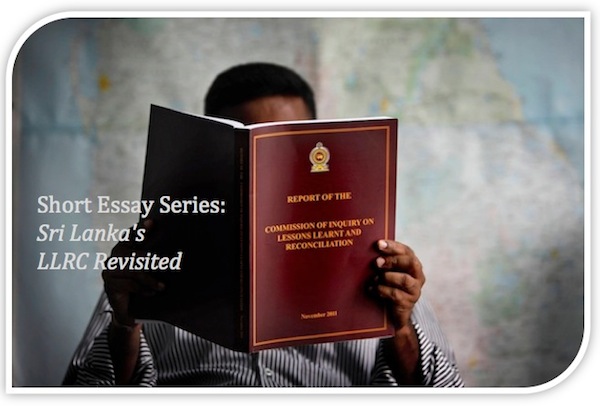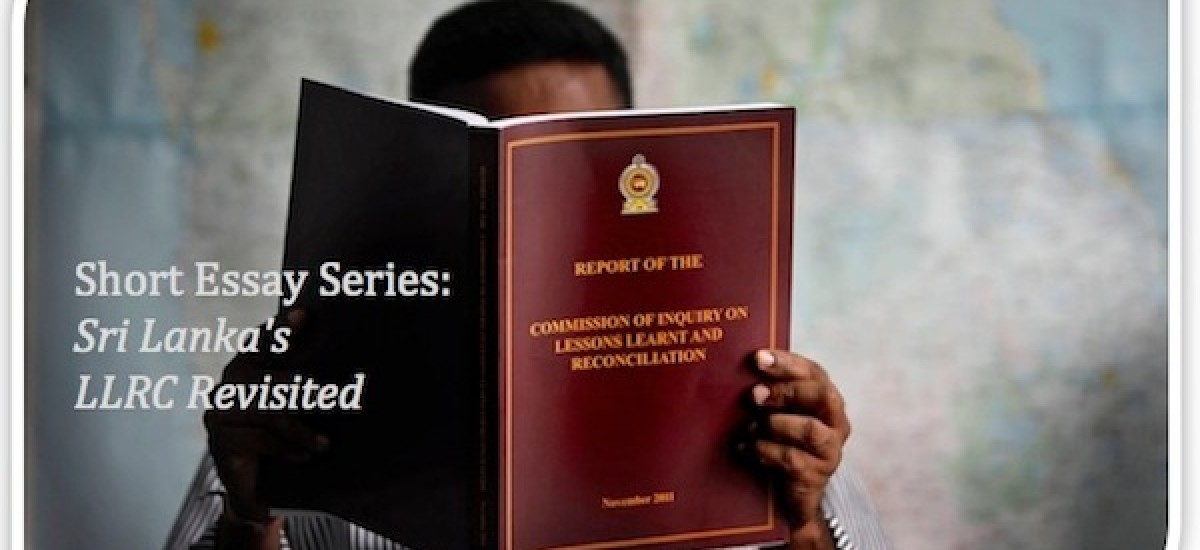
Learning lessons is a humbling experience. It takes place with the admission that one has made mistakes. Having made them, one feels the adverse consequences; having felt them, one realizes the importance of learning from those mistakes, learning not to repeat them, learning the required lessons. In the realm of politics, then, this process, this matter of learning lessons, is an extremely humbling and bold exercise.
Viewed from this perspective, the establishment of the Lessons Learnt and Reconciliation Commission (LLRC) was a necessary, but ironic, exercise. Necessary, because the situation was ideal for a more honest and forthright discussion of what needs to be learned to prevent conflict in the future; ironic, because the process was to be initiated soon after a conclusive defeat of an opponent, by a clear victor who now stood firm and proud on the battlefield, by a government which had claimed to have made no mistakes. The challenge was immediately evident.
It is within this overarching context that a brief examination of one aspect of the LLRC’s recommendations – devolution of powers – needs to take place; bearing in mind, however, that the problem sometimes lies, not only with the protagonists who are supposed to learn lessons, but also with the nature of the very lessons they are supposed to learn. And sometimes, like in the present case, one ends up learning a different lesson, unintended.
The need for devolution
In its Final Report, the LLRC takes on the controversial topic of devolution (Chapter 8, at paras. 8.212 – 8.226, summarized in Chapter 9, at paras. 9.229 – 9.237), and in doing so introduces the topic with the sub-title: ‘The Need for Devolution of Power’. It is a positive approach, for it dismisses the question – is devolution needed? – as an irrelevant one. The LLRC’s answer is clear: devolution is needed, there cannot be any doubt about that.
Thereafter, it sets out a number of broad and basic principles, in an attempt to deal with the topic in the least-controversial manner imaginable. The LLRC states that the “issue of ‘devolution’” is of “national importance” affecting the people of Sri Lanka (para 8.213). Devolution should, in principle, be “people-centric” (para 8.216); it should promote “greater harmony and unity”, the “‘oneness’ and a common identity” while “protecting and appreciating the rich diversity” of the people (para 8.217). The principal task then “should be to ensure that the people belonging to all communities are empowered at every level especially in all tiers of Government”, and such devolution “should not privilege or disadvantage any ethnic community” (para 8.218). Devolution (which the LLRC now terms “democratic empowerment of the people”) should take place within the broader framework of human rights protection (para 8.219).
Tensions and ambivalence
But like in the case of many discussions on devolution, the LLRC’s recommendations on devolving powers brings out the inevitable and inherent tensions that often lead to prolonged debate. This often happens when one attempts to strike a ‘moderate’ approach, as the LLRC seems to have tried hard to do. Two such aspects which often lead to further debate stand out prominently. The first concerns the LLRC’s views on the ideal unit of devolution, the second concerns its views on how the territorial integrity and sovereignty of the Sri Lankan State should be preserved. One striking paragraph that sets out the LLRC’s views on these aspects is paragraph 8.220, which states:
“In addressing the question of devolution two matters require the attention of the government. Firstly, empowering the Local Government institutions to ensure greater peoples’ participation at the grass roots level. Secondly, it is also imperative that the lessons learnt from the shortcomings in the functioning of the Provincial Councils system be taken into account, in devising an appropriate system of devolution that addresses the needs of the people. It should at the same time provide for safeguarding the territorial integrity and unity of Sri Lanka whilst fostering its rich diversity.”
The above, when examined closely, does not lead to an easy closure of the debate concerning the broader question of how best meaningful devolution is to be guaranteed while safeguarding Sri Lanka’s unity and territorial integrity (an aspect also stressed at para 8.224). Many of the suggestions made by various parties and individuals, on how devolution of powers should take place today, can fall within the broader framework that the above paragraph seems to have formed. In other words, many of the positions on devolution can be broadly defended by reference to the broader framework set out by the LLRC.
So, for example, the improvement of the Provincial Councils system (the 13th Amendment) can be regarded as a position which is proposed by the LLRC, when one takes into account the emphasis it places on the necessity to “develop a consensus on devolution, building on what exists” (para 8.225); what exists here being interpreted as the 13th Amendment. In contrast, the position that greater emphasis should be placed on grass roots-level devolution can be defended on the basis of the LLRC’s strong emphasis on this aspect as seen from the above paragraphs, and elsewhere (wherein the LLRC’s emphasizes the need “for maximum possible devolution to the periphery especially at the grass roots level”, as per para 8.225).
Furthermore, those advocating the repeal of the 13th Amendment (or even the provisions concerning the devolution of police powers, for example) will be somewhat heartened to note the reference made by the LLRC to the “shortcomings in the functioning of the Provincial Councils system” which need to be taken into account when “devising an appropriate system of devolution” (para 8.220). But this in turn need not be interpreted in such absolutist terms; reference to the shortcomings here can amount to a suggestion to reduce the number of provincial councils, a cutting down of costs, and not the total repeal of the system.
Or, what of history? Is there a model to be followed? The LLRC states that “[h]istorically, there has been a strong tradition of devolutionary and de-centralized governance, not necessarily based on ethnicity as such, but conceived and practiced in a manner that ensured both efficiency and broad basing of governance as well as national security” (para 8.214). What is the model that comes close to this? Is it the one closer to the Sinhala nationalists, one based on the ancient divisions of Ruhunu, Maya and Pihiti; a model which was recently proposed by a few parliamentarians? Or is it closer to the model that the Tamil nationalists have in mind; of three kingdoms, with one being the northern (Tamil) kingdom? Which was the system that was not necessarily based on ethnicity? Or which system was perceived to be efficient?
No progress
An effective closure to such debates is not proposed by the LLRC. One is left with a number of unanswered questions. This is because the LLRC’s recommendations constitute only a broad framework. It lacks a concrete proposal. Given the framework set out by the LLRC, it could have, for example, suggested that a discussion takes place on the lines of the well-drafted reports of the Committee of Experts which assisted the All Party Representative Committee (APRC) – i.e. the two reports that came to be known as the ‘Group A’ and ‘Group B’ reports. Some such suggestion would have added some specificity and purpose to the debates that would ensue. Most importantly, such a suggestion would not have provided the much needed ambivalence that a procrastinating government would have secretly hoped for in the LLRC’s recommendations. That is unfortunate.
And yet, that the government is not living up to the expectations of the LLRC seems to be somewhat clear. For there seems to be no “visible progress on the devolution issue” (para 8.225) that is taking place today; and the government has forgotten that it “must take the initiative to have a serious and structured dialogue with all political parties, and those representing the minorities in particular, based on a proposal containing the Government’s own thinking on the form and content of the dialogue process envisaged” (para 8.226). In short, the government isn’t thinking.
Conclusion
The lessons that we want to learn (if we want to learn any), and the things that need to be done about devolving powers, are numerous and well known. The LLRC has only helped in highlighting some fundamentals in the broadest possible manner. Perhaps that was its task. But therein lies a lesson that now emerges from the LLRC, a lesson which even the LLRC may not have intended to teach. It is that we have returned once again to that stage of having to begin at the beginning, wherein we have to remind a government of ‘the need for devolution of powers’. With a political culture at such an elementary stage, there seems to be a long way to go before meaningful progress can be made on this issue.
What a humbling realization, and that too, over three years after the war.
###
This article is part of an initiative to document and share the progress of the Sri Lanka government’s official reconciliation process. If you are interested in finding out more about the implementation progress of the LLRC recommendations, please visit Vimansa, a website independent of Groundviews.

